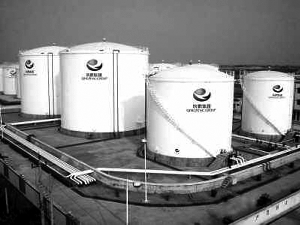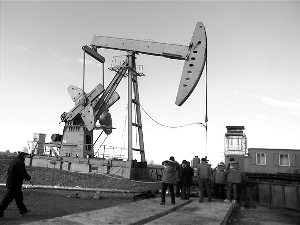Private oil companies "going out" and lack of policy support
On November 27, the National Association of Industry and Commerce Petroleum Chamber of Commerce (hereinafter referred to as the "Oil Chamber of Commerce") proposed at this year's annual meeting that the promotion of domestic private oil companies "going out" will be the main theme of the work next year. This makes “going out†once again a hot spot for private oil companies. In an interview, the reporter found that although the enthusiasm of private enterprises to “go global†has been high, and there are already precedents for success, due to the lack of support for domestic policies, private oil companies have “stepped outâ€. Hollow Block Machine,Cement Tile Making Machine,Solid Tile Making Machine Sanlian Machinery Manufacture Co., Ltd. , http://www.chinabrickmachinery.com
Shenzhen Qingpeng Industry Group Co., Ltd. has currently obtained the exploitation rights of an oil field in Myanmar with an area of ​​100 square kilometers. At present, the project has entered the investigation and signing agreement stage. The picture shows the company's refined oil storage and transportation trade bank. (photo by Zhang Xu)
It was forced out of the country by the domestic market. "The domestic oil market is now dominated by three barrels of oil: PetroChina, Sinopec, and CNOOC. The enthusiasm of our private oil companies to 'go global' is forced out." Zhao Youshan, chairman of the circulation committee (hereinafter referred to as the “Petroleum Circulation Committeeâ€), said in an interview with reporters: “Ten years ago, the number of private gas stations in the three northeastern provinces accounted for more than 90%, but it is now even less than half of the total. It is so serious that there is no oil! In particular, since 2009, the country has imposed an import tax on fuel oil imports. The refining companies have been worsened. Oil circulation companies and private gas stations have also been frequently deprived of oil. There is no oil available at home. Only “going out†can be done. Live your way!"
According to the data released by the Chamber of Commerce of the Petroleum Industry in November, China's refining companies currently have about 130 million tons of refining capacity, but only about 40 million tons of oil is refined every year, and the average operating rate is only 30% to 40%. Domestically, there is no oil, and the "State Council's Several Opinions on Encouraging and Guiding the Healthy Development of Private Investment" issued last year ("36 New China") clearly stated that "the encouragement of private enterprises to go out" and actively participate in international competition". In this environment, it is also possible for private enterprises to find oil overseas.
According to Zhang Yue, president of the Petroleum Chamber of Commerce, there are currently more than 600 member companies in the Chamber of Commerce, and private enterprises have taken steps to find oil overseas. “Two companies have done a wonderful job in Singapore. In just four years, they have transformed the company into a global large-scale enterprise. They have six 300,000-ton oil tankers. They have built 13 million cubic meters of oil tanks worldwide and sold for one year. The amount reached more than 130 billion yuan," said Zhang Yue.
Market opportunities in foreign countries Many reporters learned that the actions of private oil companies going out to find oil have also been echoed by foreign countries.
Heilongjiang Fuyuan Jianghai Petroleum Port Import & Export Co., Ltd. has just registered successfully in November this year and is mainly engaged in the oil trade with a registered capital of 30 million yuan. The legal person of the company is Zhao Youshan. One of the purposes of his establishment of the Petroleum Circulation Committee was to help domestic private oil companies find overseas sources of imported oil. In June of this year, Zhao Youshan began negotiations with the person in charge of the Haba refinery of Russia's third-largest oil company, Ali Yangsouil Co., Ltd. “There was a very positive situation. It was negotiated in 4 months. After negotiating, we will Members of the organization founded Jianghai Company and signed a cooperation agreement with Russia’s Ali Yangsi Company,†recalls Zhao Youshan.
According to the agreement, Aliyangs supplies Jianghai Company with no less than 50,000 tons of refined oil each year. The oil is sent from the Russian port of Haba and traveled on a four-hour waterway journey to the self-built oil port of Jianghai Company located next to Heizizi Island. . Jianghai Company pays each other according to the agreed amount of imported oil each month. Concern is that Zhao Youshan said that Jianghai's imported refined oil will be mainly used to supply domestic private gas stations.
"According to the contract, Russia can now give us oil, but Jianghai Petroleum Port is still under construction. At present, land leveling and design planning have been completed. It is scheduled to be completed and put into operation in October next year. Now the retail price of Haba Gasoline is only 4.8 yuan. If we increase the demand, this quota can also be increased. It depends on how many quotas our country has given us. Now we are going through the approval process for refined oil import quotas.†Zhao Youshan’s import Refined oil is full of expectations.
Different from Jianghai’s direct search for imported oil sources, some private enterprises have seized the opportunity to invest in and develop oil and gas fields overseas, hoping to gradually realize the import of oil products through the strategy of “first gas and then oilâ€. The typical representative of this is Xinjiang Guanghui Industrial Group.
Guanghui Group is a multinational large-scale private enterprise group that integrates energy development, automotive services, and real estate. According to Sun Guangxin, chairman of the group, the Zhai Sang oil and gas field under the TMB Corporation of the Republic of Kazakhstan in 2008 was under tight funding and intended to be transferred. At that time, under the matchmaking of Liu Xinli, county party secretary of Jilin County, Xinjiang, the two sides quickly reached an agreement. On July 26, 2009, Guanghui Group and TBM company leaders reached a cooperation agreement. According to the agreement, Guanghui Group acquired a 49% stake in Kazakhstan State TBM Company for 280 million yuan, and jointly developed a 8,300 square kilometer oil and gas block in the Zhai region with TBM Corporation. According to the existing exploration, the block has proven reserves of 5.3 billion cubic meters of recoverable natural gas, 100 million cubic meters of heavy oil reserves, and can annually supply 500 million cubic meters of stable gas to the LNG project in Jimina County, Xinjiang, with continuous supply of 20 gas. year. To this end, Guanghui Group plans to invest 648 million yuan to build a 1.5 million cubic meter/day LNG plant and supporting facilities in Jimunai County. After the project is put into production, the annual sales income will reach 10.25 billion yuan, and the annual tax payment will be 80 million yuan.
Sun Guangxin said that they are preparing to build a refinery in the lower reaches of Jaisan China. The pre-refinery scale will be between 2 million and 5 million tons/year.
The policy has a slogan but no content. “We finally reached out to TBM, and we also reached an agreement, but the biggest pain is how to get the project to land in China. Because private companies take oil and gas resources abroad, processing operations in the country This is no precedent in China. At a critical moment, it must be coordinated by senior government officials because it is an obstacle that cannot be overcome by relying on the strength of Guanghui Group,†said Sun Guangxien.
What makes Guanghui pleased is that with the full support of the Xinjiang Uygur Autonomous Region government, the Jasang Oil and Gas Field Project was eventually approved by the National Development and Reform Commission.
However, there are not many private oil companies with good luck such as Guanghui Group. Compared with the scale of hundreds of domestic private oil refining companies, there are still a few who can “go outâ€.
There are two biggest obstacles in this case. First, the quota of crude oil is limited. Second, it is difficult for private oil companies to make loans.
It is understood that at present, China's crude oil imports are subject to a quota system, which is divided into state trading quotas and non-state trading quotas. According to China’s commitment to China’s accession to the WTO, non-state trade quotas will be issued each year from 2002, allowing non-state trading companies to import part of crude oil. However, quotas for importing non-state-owned trade are not shared by private oil companies. The foods that share this piece of cake include companies registered by PetroChina and Sinopec. According to China's current policy, if companies outside PetroChina and Sinopec Corp. import crude oil, they must hold a certificate of “distribution†(arrangement of production) issued by the two major groups, and the customs office will release it before the railway department will arrange transportation plans. According to such a policy, even if the privately-owned oil companies are qualified for crude oil import operations and import quotas, it is difficult to import crude oil separately.
Shandong Chenxi Group is a privately-owned oil company with a registered capital of 550 million yuan. Its business covers international trade, petrochemicals, fine chemicals, coal chemical industry, and petrochemical products. Shao Zhongyi, chairman of the company, said: "The cost of getting oil overseas is very low now. I want to go out and get oil, but how can I get some oil back? I don't have the qualifications for importing crude oil and refined oil, and they are produced abroad. After the end of the game, the domestic equipment is still not enough to eat, and the state has liberalized the private oil enterprises policy in recent years, but it is too difficult to implement.I have declared the import qualification of crude oil refined oil for many years. Filled a house quickly, but there is no news until now."
Zhao Youshan told reporters whether there is an important factor in the ability of private oil companies to “go abroad†is the bank’s loan support. Domestic private oil companies did not have many bottoms under the monopoly mechanism in these years. If there were no bank loans, what would they "go out?" However, from the current point of view, although the policy of encouraging private enterprises to “go global†has been repeatedly issued at the national level, the actual support policy has not been seen and loans are still difficult.
In June 2005, Heilongjiang Longdu Petroleum Co., Ltd., a private company, announced that it had signed an intent agreement with Lukoil Petroleum and oil companies in Russia in an attempt to build a transnational upstream-downstream oil company with a total investment of One billion yuan, Russia invested 300 million yuan, Longdu company invested 700 million yuan. For a time, Longdu Company was crowned with the title of “the first private enterprise†involved in Russian crude oil extraction. However, afterwards, Liu Lizhu, Chairman of Longdu Company, began to travel around between the Heilongjiang Provincial Department of Commerce, the Ministry of Commerce, the National Development and Reform Commission, and other relevant regulatory authorities, and he wanted to solve the financing problem. However, due to the fact that the state has not loosened the policy of private oil companies entering the oil market and private enterprises to carry out oil cooperation overseas, which bank is afraid to give financial support to this project.
"The agreement was signed, but the funds could not be implemented. As a result, this project was snatched by the oil companies of other countries." Liu Lizhu said. 
Xinjiang Guanghui Group laid a natural gas pipeline in Kazakhstan. (photo by Jiang Gong)